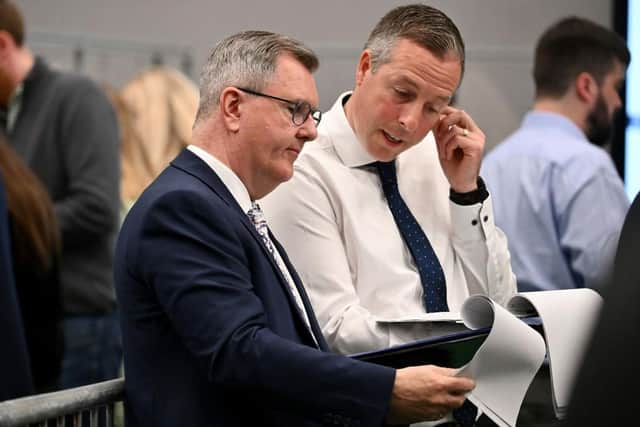Sir Jeffrey Donaldson took decision to withdraw First Minister Paul Givan with ‘great reluctance’
and live on Freeview channel 276
The Northern Ireland Assembly has been in flux for the last 16 months since that move. The DUP is refusing to participate until its concerns around the Northern Ireland Protocol are addressed by the UK Government. The UK re-entered negotiations with the EU earlier this year around post-Brexit arrangements and agreed the Windsor Framework.
Appearing at the Northern Ireland Affairs Committee on Wednesday, Sir Jeffrey Donaldson said he wants to see the Government ensure legal protections in for the region for future UK and EU law changes. He said the Windsor Framework is due to come into force in October. Ahead of that, he said his party has put proposals to the Government.
Advertisement
Hide AdAdvertisement
Hide Ad“We want to give the Government time to respond to that. And I think it’s important we respect the integrity of that process,” he said. “We’ll see what the Government responds with and then we can determine what we say publicly, obviously, the outcome of this process will become a matter of public record that has to do, but I want to ensure that we get the right outcome.”


Then-First Minister Paul Givan resigned in February 2022, while other ministers remained in post and could take a limited number of decisions. Since then an Assembly election saw Sinn Fein overtake the DUP to become the largest party. This means Sinn Fein is currently entitled to nominate the next First Minister, and the DUP to nominate the next deputy First Minister. However, the Assembly has remained effectively collapsed while the DUP refuses to participate.
Sir Jeffrey told MPs that he wants to see devolution restored. “I want to see the Assembly fully functioning and doing its job even better than before. I want to see an Executive that works, and maybe we can improve that, too, in the future,” he said.
“There are some who allege that the DUP’s reluctance to go back into power sharing is because of the way in which the First Minister and deputy First Minister will operate going forward. They are joint offices. When devolution returns, we will nominate a minister to that office. We are very clear about that, that is not the issue for us.” He insisted his decision to withdraw Paul Givan as First Minister in February 2022 was “proportionate”.
Advertisement
Hide AdAdvertisement
Hide Ad“It was with great reluctance that I took the decision in February 2022 to withdraw the First Minister,” he told MPs. “I felt it was a proportionate decision that would buy time to allow for negotiation to take place whilst all the departmental ministers remained in place, albeit the Executive itself couldn’t meet, but at least there were ministers in post and that enabled a degree of decision-making within Government departments.
“So I was hoping that within that period, that we would see meaningful engagement and negotiation leading to solutions in terms of the concerns that Unionists have about the agreement.” Sir Jeffrey stressed the importance of consensus in Northern Ireland politics, quoting former SDLP leader John Hume: “In a divided society, you cannot operate on majority rule, you’ve got to operate on the basis of consensus.”
“John Hume championed the concept of consensus and the reality is that at the moment in Northern Ireland, that cross-community consensus in relation to some very fundamental issues that impact on the day-to-day lives of the people of Northern Ireland, arising from the Northern Ireland Protocol as part of the EU Withdrawal Agreement, means that that consensus has been seriously undermined,” he said.
“We sought to resolve those issues whilst the Executive remained in place, we were party to the New Decade, New Approach Agreement at the beginning of 2020, we worked in good faith, and a key commitment in that agreement was an undertaking by the United Kingdom Government to ensure that our place in the internal market of the United Kingdom would be protected in any post-Brexit arrangements.
Advertisement
Hide AdAdvertisement
Hide Ad“The protocol doesn’t do that, and it is now acknowledged by the Government and indeed by the Irish Prime Minister, the current Taoiseach, that the protocol actually harmed our ability to trade with the rest of the United Kingdom.”
Sir Jeffrey started his evidence by outlining his party’s opposition to the Belfast/Good Friday Agreement in 1998. While Sir Jeffrey was not a member of the DUP at that point, as a UUP member he walked out of the talks before the final agreement was signed. He told MPs there was nothing for victims of the Troubles in the agreement, while paramilitary prisoners were released.
Sir Jeffrey said there were also concerns around proposals to reform policing, saying they did not want the then-RUC to be scapegoated, and also concerns around how the institutions would operate. He added that many of their concerns around “significant flaws” in the 1998 deal were dealt with at St Andrews in 2006.
But he said that the change to how the First Minister and deputy First Ministers are nominated, as opposed to the original method of being elected by the Assembly, was made by Government, not requested by the DUP.